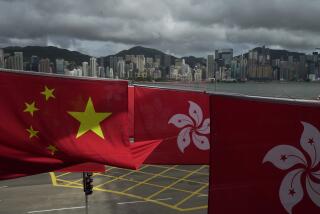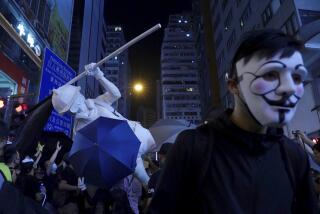The End of Empire and Great-Grandpa
- Share via
ARDMORE, Ireland — As the British flag was hauled down in Hong Kong on Monday night and the red one hoisted in its place, I was able to savor the moment (late afternoon, local time) by raising a glass in front of the tomb of my great-grandfather, Sir Henry Blake, who was governor of Hong Kong in 1898 and thus the man who signed the treaty that expired this week.
The note being struck in the British press is one of rather muted elegy to ended empire, but this scarcely does justice to the often vigorous and occasionally noble souls who found themselves representing the interests of the British Empire when it was not far past its zenith.
Take Sir Henry and his wife Edith, Lady Blake. They led romantic lives. She was an heiress here in 19th century Ireland when it was just as much of a colony as Hong Kong. He was a young member of the Royal Irish Constabulary. He would visit her home in west Cork, supposedly to teach her and her mother the piano. The mother, who hadn’t spoken to her own husband for 20 years, communicating to him by note via butler across the vast mansion, rather fancied Henry and was all the more incensed when her daughter eloped with him.
Edith was disinherited. But her sister Grace stood by her and with her own husband, the Duke of St. Albans, intrigued with the Colonial Office to get Henry a job.
The great pile of scrapbooks I’ve looked through attested to their success and Henry’s abilities. The first album is a little dour, since his first mission was to govern chilly Newfoundland. Things looked up thereafter with appointments to the Bahamas and Jamaica. Then came the big assignment to Hong Kong.
Probably because of their somewhat unconventional Irish background, Henry and Edith were scarcely stuffed-shirt imperialists. They took trouble to learn both Mandarin and Cantonese and were the first to invite Chinese regularly to the governor’s mansion. Sir Henry plunged into intrigues in support of Sun Yat-sen, hoping to draw the British government into support of this republican challenge to the corrupt and faltering Qing dynasty. There were bellows of outrage from London and Sir Henry was forced to desist from his efforts to form an alliance for the democratic reform of imperial China.
He also became richer, gubernatorial assignments being regarded in those days as reasonably legitimate opportunities to make money. Poring over Sir Henry’s account books a few years ago, my brother Andrew came across references to an “opium farm” the governor ran with his close friend and business associate Sir Robert Hotung.
On a subsequent visit to Hong Kong, Andrew was attempting to locate where the farm might have been when he realized that “farm” was being used in the sense of “tax farm,” and Sir Henry and his Chinese associate were taking their cut of the opium trade, forced upon the Chinese by opium wars earlier in the century.
Sir Henry signed the 99-year lease on Hong Kong and left soon thereafter to become governor of Ceylon, where he fostered the rubber plantations that spelled twilight for the rubber magnates of Brazil. Then he retired and bought Myrtle Grove, Sir Walter Raleigh’s old house in Youghal, eight miles west from here.
Myrtle Grove was well freighted with colonial mementos, and there was even a Chinese museum. There was also an imposing 15-foot high pair of wrought iron gates in the Chinese style. Sir Henry had them shipped to Ireland after he’d acquired them from one of the villages in the New Territories. Some time in the 1920s, the headmen of this village wrote to my great-grandmother--by now a widow--saying they would like to have their gates back. She had them copied and shipped them round the world again.
Perhaps some of the troops of the People’s Liberation Army trundled through them earlier this week on their personnel carriers, on the way to replace the British garrison in Hong Kong. This would not have bothered Sir Henry, who had no great love for the British military and never wore a uniform.
On Monday I wandered through the ruins of the Chinese museum. Long gone were the swords, Chinoiserie and photographs of Chinese pirates having their heads chopped off. I stopped by Henry and Edith’s tomb. I don’t think either of them would have had any nostalgia for empire. Edith, indeed, was a supporter of that Irish foe of colonialism, Parnell. Both probably would have been amused that the new symbol of Hong Kong is the Bauhinia blakiana orchid, named for Lady Blake, a botanist and flower painter of the first rank, and which, on Hong Kong’s new currency, replaces the queen.
More to Read
Sign up for Essential California
The most important California stories and recommendations in your inbox every morning.
You may occasionally receive promotional content from the Los Angeles Times.













